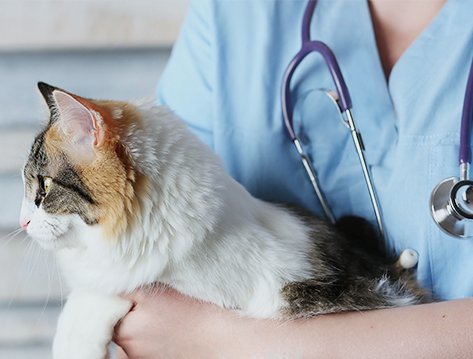What is Addison’s disease?
Addison’s disease (Hypoadrenocorticism) is an uncommon disorder caused by inadequate levels of two types of adrenal gland hormones — glands in the abdomen close to a dog’s kidneys. The hormones produced are essential and if left untreated Addison’s disease can be life-threatening.
The two essential hormones are;
- Glucocorticoids. A natural form of steroid (cortisol). Cortisol helps your dog to respond to stress, improves appetite and has an effect on the function of the immune system that helps them to fight off infections.
- Mineralocorticoids. Such as aldosterone which helps to regulate water and salts (electrolytes) in your dog’s body. ‘Atypical’ Addison’s disease is a more uncommon presentation in which only glucocorticoids are inadequate. This may progress to typical Addison’s overtime.
Addison’s disease in dogs occurs most frequently in young to middle-aged female dogs but has been diagnosed in dogs of all ages and either sex (including neutered animals).
While any breed of dog can be affected by Addison’s disease some are more prone to others, which include:
- Standard Poodles
- Bearded Collies
- Great Danes
- West Highland White Terriers
- Soft Coated Wheaten Terriers
What causes Addison’s disease in dogs?
Most commonly Addison’s disease in dog’s occurs due to damage to the adrenal glands by the dog’s own immune system. Normally the immune system fights off infections, but sometimes it can become overactive and damage the adrenal glands, this is known as an immune-mediated disease.
Occasionally, Addison’s disease can also be caused by an infection that invades and kills the adrenal gland tissues. Less commonly, the condition can be a result of cancer that has spread and invaded the adrenal glands.
Symptoms of Addison’s disease in dogs
Symptoms can come on over a period of months or quickly over a few days. The signs can be extremely non-specific, but a combination occurring at once can indicate the presence of Addison’s disease. The most common signs of Addison’s disease in dogs include:
- Reduced appetite
- Lethargy and weakness
- Vomiting
- Diarrhoea
- Weight loss
- Shaking
In severe cases, some dogs will collapse and develop shock-like symptoms. This is known as an ‘Addisonian crisis’ that requires immediate assistance from an emergency vet.
How is Addison’s disease diagnosed in dogs?
Blood tests including salt levels (electrolytes) will show changes — an increase in potassium and decrease in sodium are the major findings. These can also occur with some other conditions, so a specific ‘ACTH stimulation test’ is required to confirm the diagnosis.
The blood tests will also show if your dog is suffering from an infection. Imaging such as ultrasound and CT scan may be carried out if a tumour is suspected in your pet.
Treatment for Addison’s disease
Initially, when a dog is diagnosed with Addison’s disease they will require hospitalisation to correct dehydration and salt imbalances by fluid therapy and intravenous medication. Once stabilised, your dog will require lifelong treatment with hormone replacement medication.
- Zycortal Injections. These should be given approximately once a month under the skin. This medication replaces the mineralocorticoid deficiency and helps your dog to maintain their salt and fluid levels. The amount of medication may need to be changed over time, so initially, frequent blood tests are required to monitor their response and allow accurate control of the condition. Once under good control, the frequency of blood tests can be reduced.
- Prednisolone. Is a tablet form of treatment which is given to the animal on a daily basis. This medication replaces the glucocorticoid deficiency and helps your dog respond to stress and infections. During a period of stress, e.g; going into boarding kennels or because of other illness, your dog may need an increased dose of Prednisolone to help them cope with this.
Managing Addison’s disease in pets and what to expect
Following the initial treatment and diagnosis, dogs with Addison’s disease can be put onto the right treatment plan and the majority will go on to live a healthy balanced life.
Once an animal returns home from initial treatment for Addison’s disease there are some key signs to be aware of and monitor for any noticeable changes in your pet:
- Lack of appetite
- Thirst and urination
- Stools (consistency and presence of blood)
- Bodyweight
- Demeanour (lethargy and depression)
Regular veterinary treatment
Regular electrolyte blood tests are required, to monitor Addison’s disease in dogs. These tests are usually carried out 10 days after starting Zycortal therapy, then again at 25 days. Depending on the results the interval may then be extended to monthly or continued at 10 and 25 days following every dose change until stable.
This is crucial to stabilising your dog and every dog is different so please be prepared for regular visits until your dog is stable.
What is the prognosis for a pet diagnosed with Addison’s disease
Once dogs with Addison’s disease are diagnosed and properly treated, they can live a long and happy life. Treatment is almost always successful and rewarding.
If left untreated, Addisons disease in dogs can prove to be life-threatening, which is why it’s important for owners to be aware of the typical signs of Addison’s disease on their pet.
Emergency conditions associated with Addison’s disease
Please contact your local Animal Trust surgery immediately if you notice any of the following signs in your dog;
Addisonian crisis in dogs
This can be brought on by an infection in a dog who had previously been coping well with the disease. Signs include:
- Sudden weakness
- Severe vomiting
- Diarrhoea
- Collapse
- Shaking
Symptoms of gastric ulceration in dogs
- Abdominal pain
- loss of appetite
- vomiting blood
- tar-like faeces (sticky, black stools can indicate digested blood)
If you’re concerned your pet is suffering from symptoms of Addison’s disease, contact your local Animal Trust surgery or book a free consultation online to have your pet checked as soon as possible.

